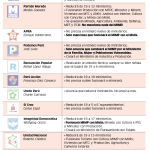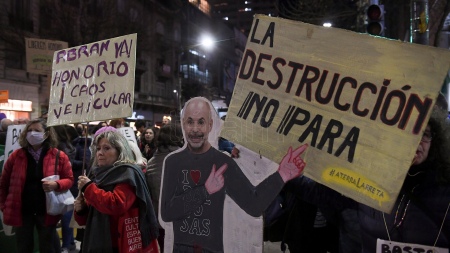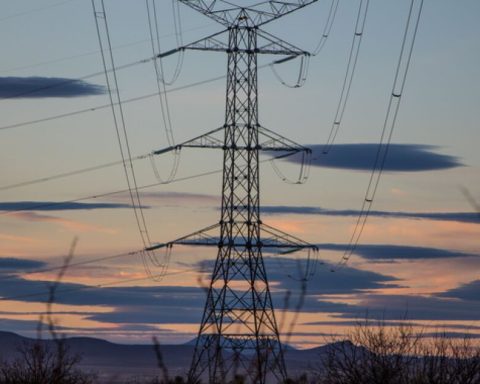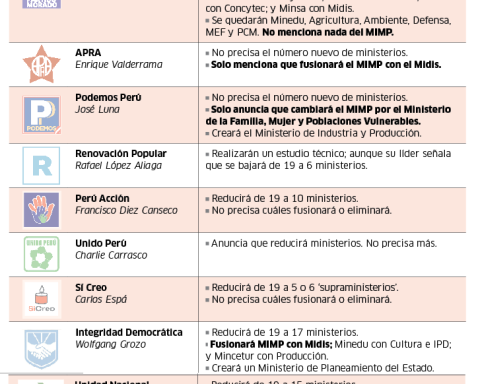This Monday marks the 99th day since the plebiscite on September 4 and the triumph –with 61.9% of the votes– of the Rejection option to the Constitution proposal. During the morning of this day, “the small table” is cited, that is, a committee with four representatives from each side: the government alliance and the opposition. The knot? The same one with which this second constituent period started: the composition of the future drafting body of the Magna Carta, and whether or not the designated experts will have the right to vote. In three months, congressional negotiators have failed to unravel the initial knot.
The committee –or “small table”– It is integrated, on the one hand, by Alberto Undurraga (DC), Paulina Vodanovic (PS), Diego Ibáñez (CS) and Lautaro Carmona (PC). Meanwhile, the opposition is represented by Javier Macaya (UDI), Gloria Hutt (Evópoli), Francisco Chahuán (RN) and Zarko Luksic (former DC, currently from Amarillos).
This number of representatives was configured after the ruling party asked that the table be reduced, and because there were parliamentarians who had complications to attend, since this Monday a new extension of the State of Exception for Bíobío and La Araucanía is being voted in Congress.
“On Monday there has to be an agreement, if not, there is nothing,” said one of the government alliance negotiators in the corridors of the former National Congress on Friday, after 9:00 p.m., before it was known that again they had not signed an understanding.
“We hoped to reach an agreement this week, in fact, the president of the UDI (Javier Macaya) was clear about the deadlines that were running, and President Boric himself, in a call that I value, reiterated the need to establish an agreement , urged us to establish an agreement. Unfortunately, intransigence has prevailed,” said the senator and president of the Upper House, Álvaro Elizalde, this Sunday.
Taking into account that the Electoral Service (Servel) advised that the next election be held in 2023 and reported that it needed at least 140 days to organize what has to do with the electoral roll; that the agreement that is signed in the former Congress must still be processed there as a constitutional reform, with a quorum of 4/7; and that April 16 had been set as the ideal date for the elections of members of the body, the political parties are behind schedule. For this reason, they assure that this Monday is crucial to reach a determination.
There remain two paths that have been legitimized during the talks. One is the last one that the left proposed and that was also supported by Democrats: 70 elected –no lists of independents– and 30 experts appointed by Parliament with an impact on transitional rules and harmonization.
The second alternative is the one promoted by the opposition: it proposes that the designated experts have a voice and vote throughout the process. From Chile Vamos it was interpreted that President Gabriel Boric validated it with his words on Wednesday, December 7.
After the negotiations focused on the proportion of experts on Tuesday, with the ruling party tending to move towards a mixed formula, on Wednesday morning the President stated that “an imperfect agreement is preferable to not having an agreement.”
However, from the official –that that day proposed a 100% elected body of 50 members– It was not read that way, but rather they interpreted the message as that all the groups had to give in, and in this new formula they proposed a much smaller number of members than they originally sought.
In addition to the fact that the mixed party was an alternative studied on Wednesday by the ruling party, government representatives had previously given space to a body of such characteristics. The president of the PS, Paulina Vodanovic, argued in October –during a program CNN– that the party line was that of a 100% elected mechanism, but that it was not necessary to “close oneself to alternatives, such as, for example, that there could be an 80-20 Convention.”
Cristián Warnken’s designated experts
During the weekend some darts, especially from the leftist parties, went directly to the Amarillos formation party.
“Power is the influence they have over Chile Vamos to push them to reject an option that they themselves proposed (Chile Vamos): 50 people elected as the Senate, and with parity; supranumerary indigenous seats. And today it is what we are asking that we be able to sign”, assured on Sunday the deputy and president of Social Convergence, Diego Ibáñez, in the program ‘Center Table’ of TV 13. With his phrase he recalled the consequences, in his opinion, of the weight of Amarillos in the negotiations last Wednesday.
According to negotiators from the ruling party, on Wednesday, December 7, when the left and right were close to agreeing on a position under the idea of 50 elected officials, the head of the Amarillos party in formation, Cristián Warnken, maintained that they were in favor of the body being appointed 100% by Congress and that, if a campaign was opened and they were 100% elected, “we are not going to sign and we are going to campaign against it.”
Earlier that day, Warnken assured the press that, if the agreement contemplated a fully elected Convention and not one designated by the parliamentarians in office, “the representative and democratic body that is Congress is being invalidated, a kind of of de facto dictatorship, those are the populist paths”.
Also in ‘Mesa Central’, the president of the PPD, Natalia Piergentili, said that “Amarillos is sitting at the table because it has a power of media influence.”
In the same program, Warnken responded to the accusations: “Can anyone believe that this little party, this little David of Chilean politics, is going to be the obstacle to reaching a constitutional agreement? I find that statement unpresentable and not very credible.” “We are a party in formation. We are not even going to manage to take candidates to conventional ones, we are not going with the electoral calculator, ”he added. “How are you going to drag Amarillos to Chile Vamos?” He raised.
“What we see are advances that end up being torpedoed by Amarillos, whose only interest is that there are no elections (…), they want appointed experts and they do not want democracy,” was what the PS helmsman pointed out when getting off the third floor after the end of the series of meetings on Friday.
When the different representatives began to leave that Friday, members of Amarillos approached members of the ruling party to ask them why they were being assigned the responsibility of having boycotted the process. “That’s what the press is saying,” they said.
From the ruling party they explained, in reserve, that it was mainly due to what happened on Wednesday since a member of the party in formation, Zarko Luksic, had been the one who took the floor to reject the offer of the ruling party on Friday.
no consensus
“Today we do not have an agreement due to the pressure from Amarillos and the resistance of Renovación Nacional,” said the president of the Party for Democracy (PPD), Natalia Piergentili, at almost 10:00 p.m.
After that hour, the president of the Senate, Álvaro Elizalde, went so far as to say that they were “very close to reaching an agreement.”
And it is that, after the Chile Vamos más Amarillos block insisted on the proposal with which the second group arrived on Friday morning –which was related to a body of 50 elected officials and 25 experts–According to attendees, a hostile environment was created.
The left argued that it was not satisfied with the proportion elected/experts, due to the “social legitimacy of the process” and that, for a matter of “democratic legitimacy”, the number of elected representatives should be considerably higher than that of appointed. And because a A number like 50 elected would only support it without experts, because it is an electoral sacrifice for the progressive bloc: made up of small parties and that are more successful in large regions.
They explained that, to prevent the talks from stagnating, and due to the tension in the general room, they decided to create the “small table” mentioned above. In that instance, the ruling party proposed a body of 70 elected officials and 30 experts appointed by Congress, with an impact on transitory regulations and harmonization. Two of the representatives of the ruling party who were present detailed that there seemed to be an agreement in that direction. So much so that a negotiator from the general table described that they asked to “go get the ties.”
However, already at the general table and after the representatives of the smaller meeting spoke with their blocks, Zarko Luksic -the former deputy, who was DC and who today belongs to the party in formation Amarillos– took the floor to announce that Chile Vamos and Amarillos rejected the proposal.
This –they explain from the opposition–, due to the fact that the experts could not talk about the substance of the constitutional norms, since they could not influence the drafting with their vote. They add to this considering it an “incoherent conceptual design”, since the experts could have votes for some things and not others.
Plebiscite to establish mechanism
This Sunday the only parliamentarian from Amarillos, Andrés Jouannet (former DC and elected in quota of the Radical Party), In an interview with ‘Meganoticias’, He assured that he would have no problems with a referendum to define the mechanism. Unlike him, Cristián Warnken and Zarko Luksic, from the same party in formation, denied agreeing with said alternative.
“You can hold an entry plebiscite. (But) there we run the risk of, imagine, that Republicans say: ‘Leave the current Constitution or a new one.’ We would go back, and who can invalidate that”, Warnken pointed out in ‘Central Table’, an argument that was criticized within the government alliance, based on the position that the majority opinion of the citizenry could not be ignored.
The first to slip the idea of the plebiscite was Paulina Vodanovic (PS), on Wednesday of last week. However, official sources admitted that it was not a real alternative, but rather a way of putting pressure on the negotiations.
But on Friday the option began to gain strength, when the representatives of the left began to find it increasingly difficult to reach an agreement.
The head of National Renovation and senator, Francisco Chahuán, assured that there is no floor in his community for an entry plebiscite.
What has been agreed so far?
Although today the political forces are immersed in a knot, before they reached common definitions. One is the establishment of twelve institutional bases, from which the debate could not leave. Some examples are that the State of Chile is unitary and decentralized, and that the country has three powers “separate and independent from each other, such as, for example, the Executive Power, with head of government and fiscal spending initiative; the Judiciary, with jurisdictional unity and with full respect for final and enforceable judicial sentences; and the Legislative Branch composed of the Chamber of Deputies and the Senate”.
Another is the creation of a joint technical committee, made up of 14 jurists appointed by Congress. Its objective would be to be an arbitrator who can declare inadmissible the norms that deviate from the bases.

















